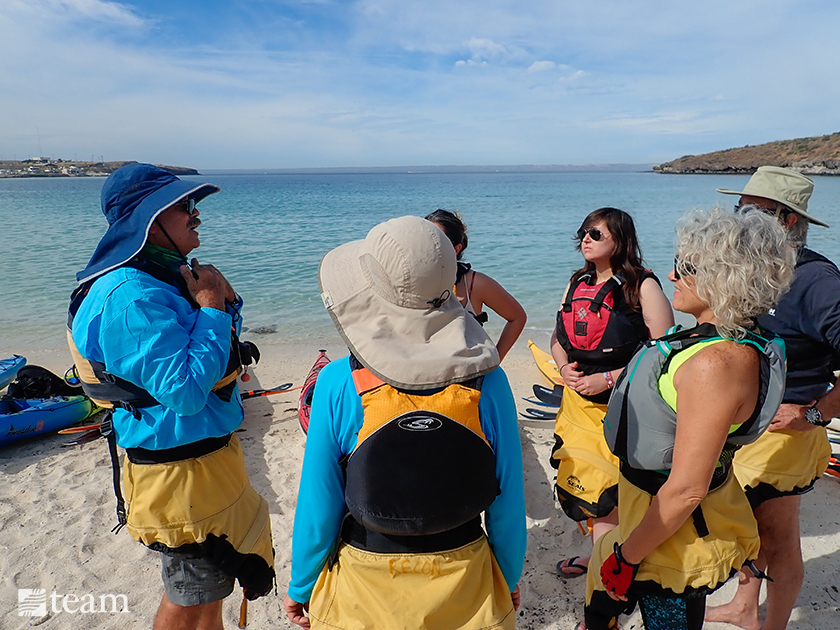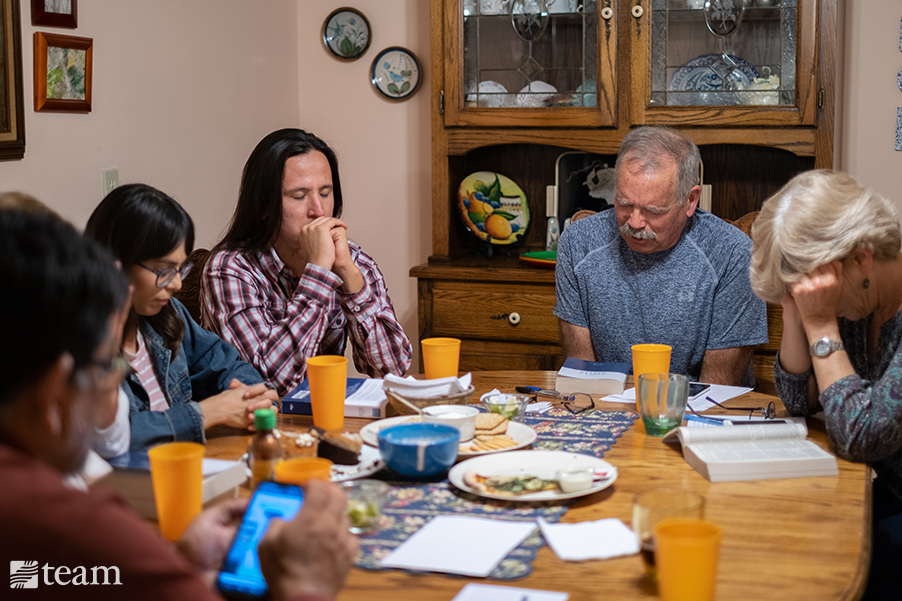
Ministry Updates
Building House Churches Through Outdoor Adventures
May 13, 2021
by Heidi Chupp

TEAM missionary Steve Dresselhaus was in his usual place of worship on Sunday morning.
Not in a sanctuary, but in nature.
Not with a congregation, but with fellow ocean enthusiasts.
Not in a pew, but in the seat of a kayak on the Sea of Cortez.
One of his friends paddled up.
“Steve, I like this church,” the man told him.
A Ministry Born out of Burnout
On any given week, Steve and Lois Dresselhaus see church happening around their dinner table, in a kayak, in someone’s yard, on a hike or in their living room. It takes place during food distribution, beach cleanups and Bible studies.
Their life in the Baja Peninsula city of La Paz, Mexico, is part ocean adventures, part creation care and part house church leadership. And it’s all ministry.
The outdoor activities all happen through Reconciliamar, a nonprofit Steve founded, and was born out of a season of burnout for Steve. He was exhausted and ready to quit missions work.
When Lois gave him a kayaking trip for Christmas, “I fell in love,” he says. He bought a used kayak and began to go out once a week “to think, pray and to escape the pressures of my work.” It was healing and restorative.
When he started taking friends with him, he saw how the outings also provided time for conversations that could point others to Jesus.
A Church That Welcomes Questions
As Reconciliamar grew, so did relationships. Their first house church was born when Steve met a couple on a kayaking trip who asked if Steve and Lois could start a Bible study.
They began meeting on Monday nights, at Steve and Lois’s home.
“It was just the four of us maybe for a week or so,” Lois remembers. “And then another friend joined us and [it] just kept growing little by little.”
The group called themselves Salmo Uno, or “Psalm 1,” after the first passage of Scripture they studied together.
Steve prepares discussion questions, but if other questions or issues come up — and they frequently do — the conversation shifts accordingly.
Rather than try to pressure or persuade, Steve and Lois pray that God will reveal the truth of Jesus to each person.

The small house churches create a family atmosphere, where people can freely worship and ask their questions about God.
They work to create an accepting atmosphere, says Lois, “where people feel like they can raise questions and not necessarily have everything be pat answers.”
Believing that ministry can happen outside of traditional church settings, Steve and Lois intentionally keep things simple and sustainable. They don’t rent buildings so finances can’t create obligations or drive their activities. They avoid Sunday mornings because that’s the only day off most people have in La Paz.
Feeling the Family Love
Laura loves nature, she loves kayaking and she loves Jesus. She joined Reconciliamar activities “because of what it offers,” she says.
“Just to be able to connect with your spirit through nature and to be able to share your feelings with other people.”
For Laura, there’s no distinction between fellowship in kayaks and meeting together for Bible study in their house church.
“Even when it’s time to wash the dishes, you can feel the family love,” she says.
Laura has experienced that love in very practical ways. As a single mom, she’s faced heartbreak and difficult times. When her car kept breaking down and finances were tight, the Salmo Uno group came together to help pay for repairs.
Connecting with God Through Nature
Luis is a surgeon who met Steve several years ago at a beach cleanup event.
Luis grew up in a devout Catholic family, and though his parents encouraged him to follow their traditions, he connected more with God through nature.
“Reconciliamar has been a great opportunity for me … to be able to share with people who are willing to have a more direct relationship with the Creator through nature,” he says, “to truly value and care for it.”
Steve says Luis was instrumental in the formation of their second house church.
“We’d run into a problem because we were having more people than we could comfortably fit in our house,” Steve remembers.
Out on their kayaks one day, Steve asked for Luis’s advice.
“Why don’t you start a second group on Saturdays, so I can go?” Luis responded.
“He’s with us to this day,” says Steve.
Luis and his wife sometimes open their home for the Salmo Uno gatherings too.

Spending time in creation naturally leads to conversations about the Creator and how to live lives of worship to Him.
Growing the Church in a Pandemic
The first two house churches grew out of Reconciliamar. A third church was born during the COVID-19 pandemic.
The initial shutdown during early 2020 resulted in a food crisis for many in Steve and Lois’s community. Salmo Uno members came together every week to pack and distribute groceries to around 100 families, with each family getting help every other week.
“This took us into the streets of our neighborhood and into the homes of our neighbors,” Steve says. They prayerfully decided to start a church within walking distance for anyone in the community.
Three other couples from Salmo Uno joined the leadership team, and the new church began meeting in November 2020 on Sunday evenings.
They meet on Steve and Lois’s front patio, use washable folding chairs and use nothing that needs to be plugged in. The teaching is deep but simple to the point of being reproducible.
Their dream is to see transformation from the inside out in their neighborhood — that changed lives will lead to less domestic violence, improved health, higher school attendance and less crime.
Invited into People’s Lives
They also want to see this model of sustainable discipleship continue, “to see hundreds, thousands of house churches meeting like we do,” says Steve, “reading the Bible, asking questions, praying, taking care of one another and serving the city.”
“Other than to follow Him, [Jesus] didn’t invite people to anything,” Steve stays. “He was such an interesting person that he got invited into people’s lives.”
“We are trying to do the same — be such interesting people that we get invited into their lives and then journey with them towards Jesus.”
Related articles


